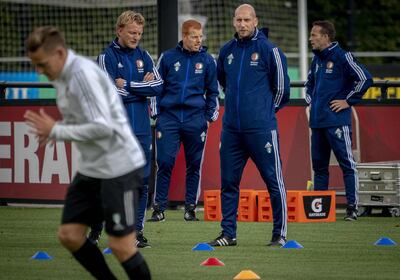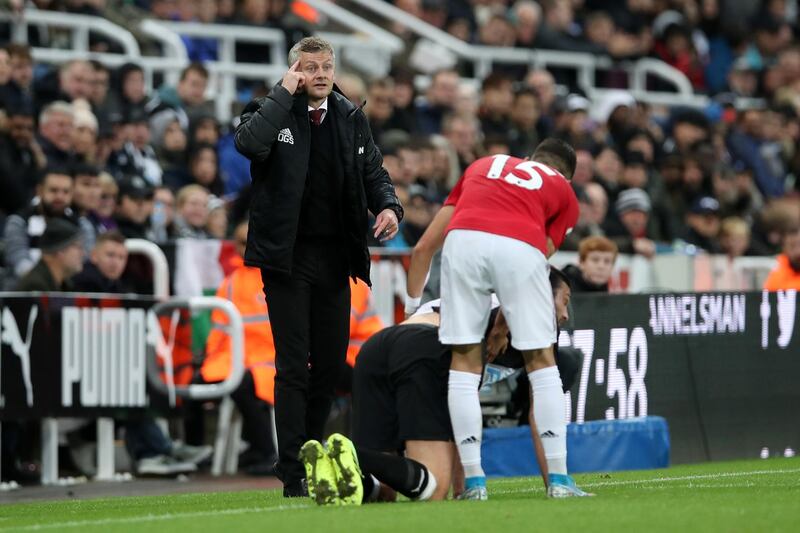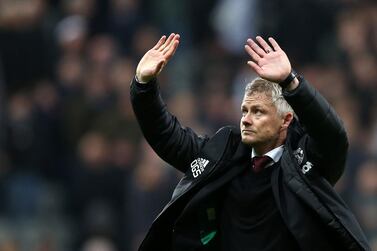At the end of May, a group of retired players from the most successful team of Manchester United’s history got together at Old Trafford to replay, for charity, the most famous night of their fabled Treble.
It was exactly 20 years on from the European Cup final they won 2-1, with late goals, against Bayern Munich, who sportingly dispatched their own veterans to take part.
For several of the United men, the anniversary seemed sweetly timed, a landmark date that also pointed to promise ahead in their second careers.
Ole Gunnar Solskjaer scored the first goal in a comfortable 5-0 canter against Bayern’s assorted retirees, having accepted, before kick-off, congratulations from old team-mates about his new job, as United manager, freshly promoted from caretaker.
After the game, Solskjaer remarked how authoritative Jaap Stam, a trim, imposing 46, looked in central defence for the United XI. Stam was accepting congratulations, too. He was about to start work as manager of Feyenoord, the most prestigious job of his managerial career.
The reunion had a good turnout, although a few key figures from the 1999 squad were unavailable. Ryan Giggs sent his apologies. He was busy managing his country, Wales, ahead of qualifiers for the 2020 European championship. Phil Neville was away readying the England women’s team for the imminent World Cup.
Neville and Giggs felt very much included, though, in the praise Alex Ferguson, United’s 1999 manager, showered on his old boys. “It’s great,” he said, “to see how the lads have progressed in life.”
To see four members of the most iconic Ferguson squad graduated to major management jobs reflects well on Ferguson. The Bayern of 1999, a side of strong characters and leaders, has not, by comparison, produced the same concentration of current, high-profile coaches.
Mind you, had United arranged a reunion of those involved in the dramatic semi-final of 1999, it would be a different story: the Juventus United came from behind to beat had Zinedine Zidane (three European Cups as a coach) Didier Deschamps (a World Cup) and Antonio Conte (three Serie A titles and a Premier League) in their ranks.
Detecting a great-manager-to-be in a player is a hazardous business – of United’s 1999 heros, Gary Neville, long designated as a manager-in-the-making, had only a brief, dispiriting spell at Valencia; Roy Keane, bristling leader on the pitch, has not held a head coach’s job for almost a decade. Sustaining a promising start, as Solskjaer, Stam, Giggs and Phil Neville would testify, can be even harder.

This has been a testing autumn for all of them. Feyenoord, who headhunted Stam from PEC Zwolle, sit ninth in the Dutch Eredivisie, a painful fall for the club who were champions two years ago. They lost 4-2 to Fortuna Sittard, who are in the relegation zone, in their last game.
United, who recruited Solskjaer from Molde in Norway, are 12th in the Premier League, a steep drop even by the standards of their post-Ferguson, post-2013 decline. They lost to Newcastle United, who had been in the relegation zone, in their last match.
In the last week, Giggs’s Wales have taken a point each from two Euro 2020 qualifiers, insufficient to put them in pole position for an automatic spot at the finals.
With two fixtures remaining, Wales can still reach the European championship. But if they do not Giggs will have fallen conspicuously short of the standards set by his predecessor, Chris Coleman, who, at Euro 2016 led Wales to a first major tournament for 60 years and reached the semi-finals.
Phil Neville took England’s Women to the semi-finals of the World Cup. But the months since have been downbeat, with one win in his last six fixtures. His England host Germany at a sold-out Wembley next month – a major examination of how far he is appreciated by the English public.
Stam and Solskjaer, meanwhile, confront the most highly-charged fixtures on their calendars just when they seem most vulnerable. Feyenoord go to Ajax in nine days' time, to play out Dutch football’s most raucous rivalry on unusually mismatched terms. Ajax are top of the Eredivisie, Stam’s team barely in the top half.
And Solskjaer? On Sunday, just as on that reunion night in May, he will greet a set of European champions at Old Trafford. Only this time, they are the European Cup holders, the Liverpool who sit 15 points clear of United, their fiercest rivals in the Premier League, secure on their perch at the top.








